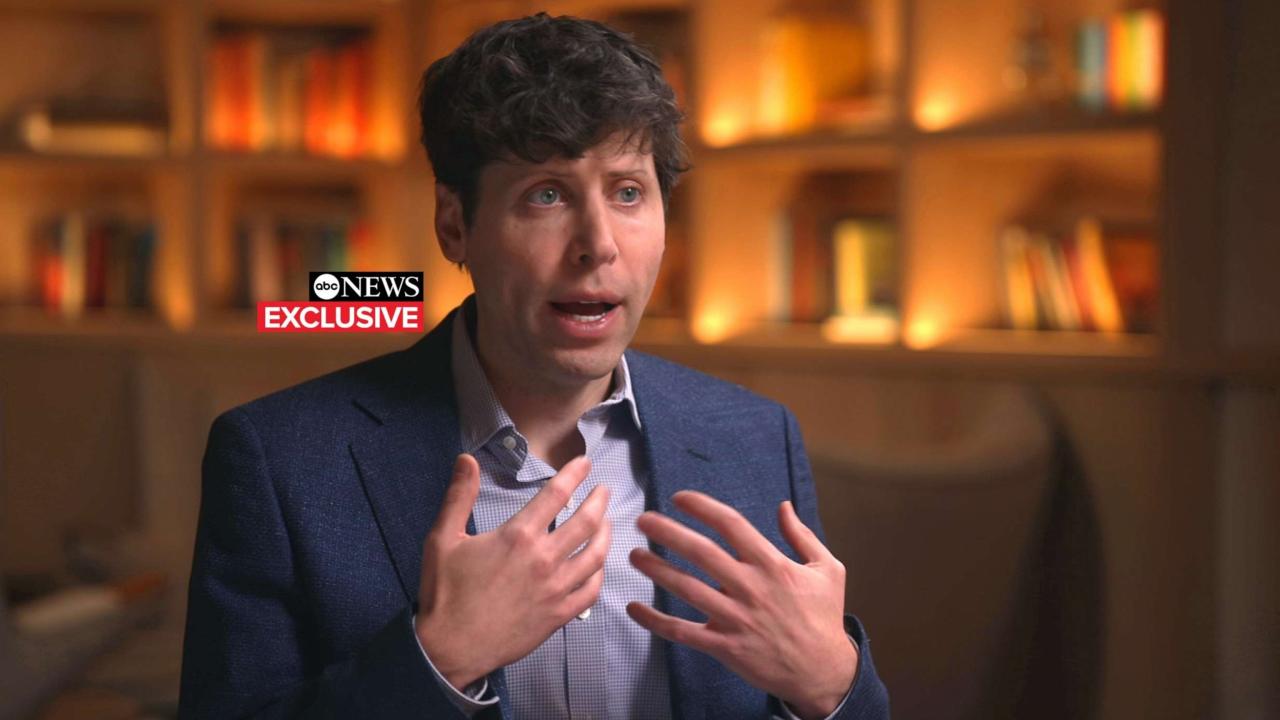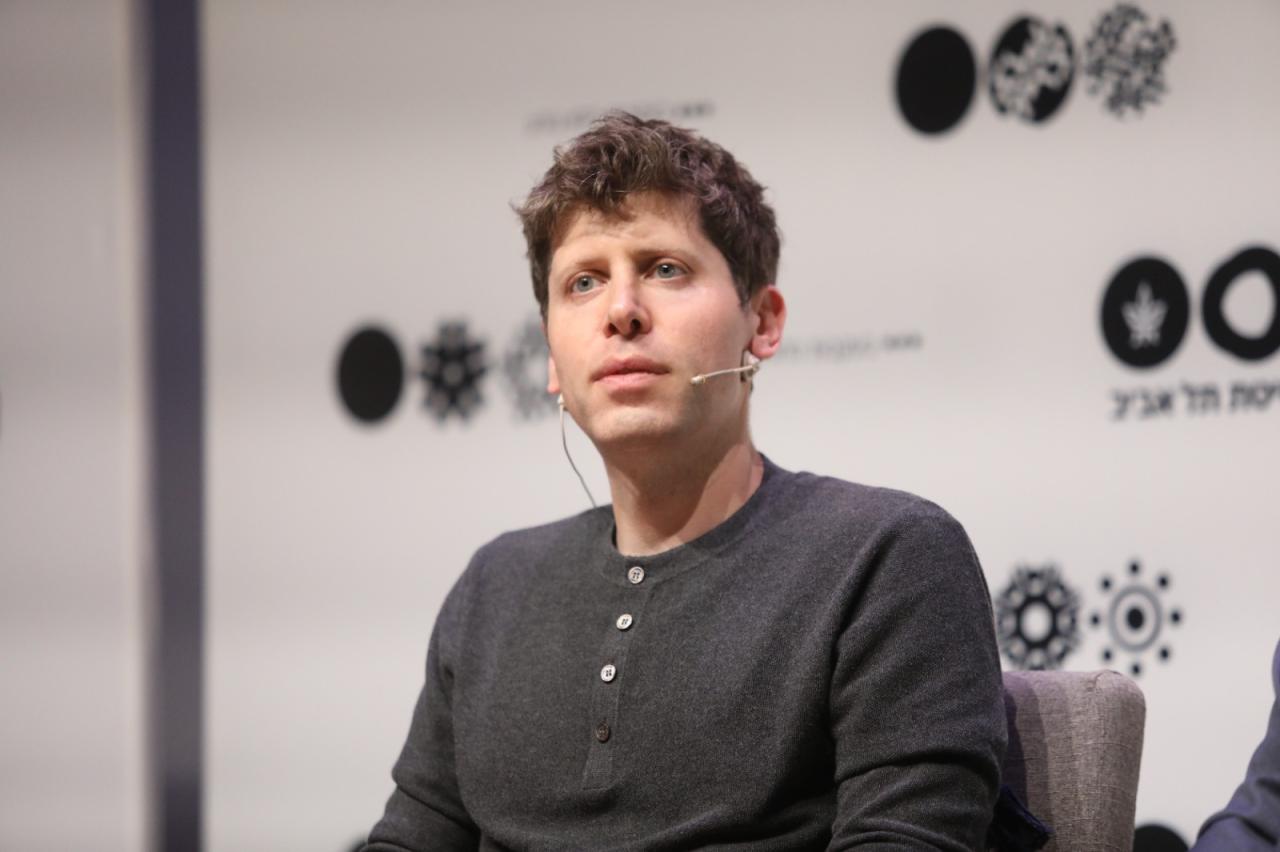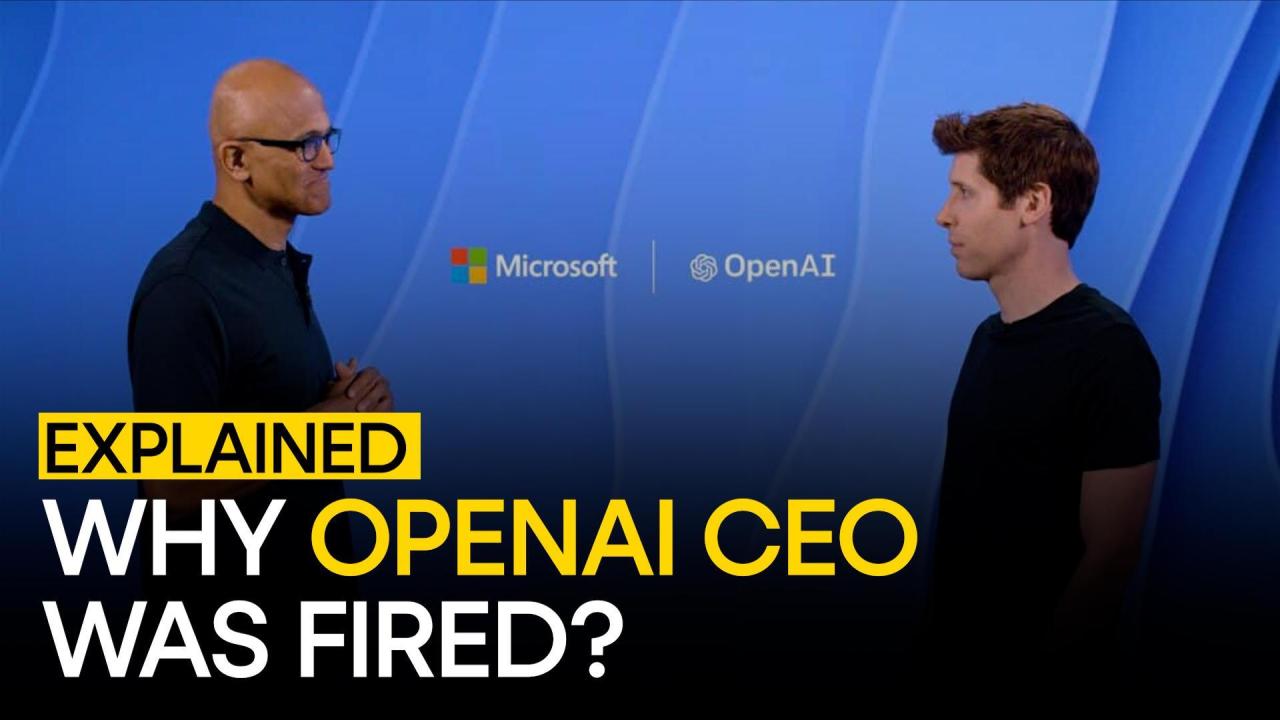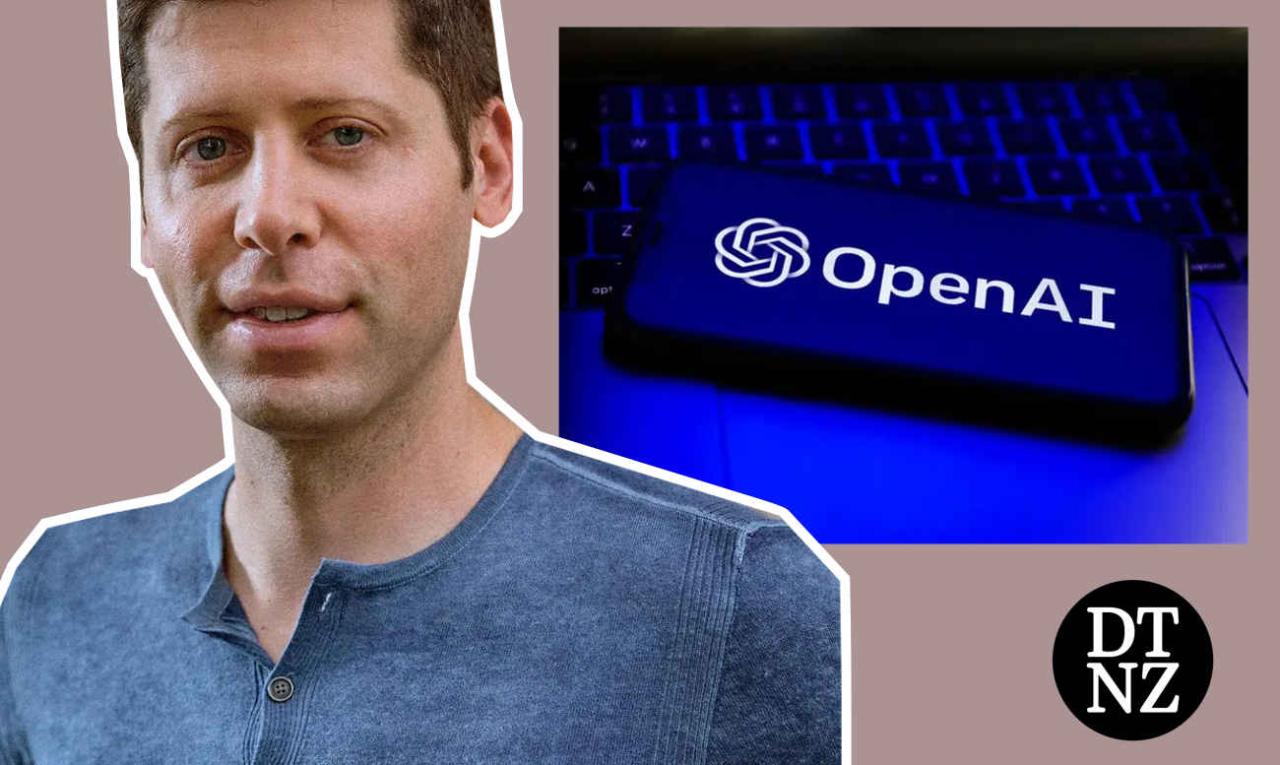OpenAI boss Sam Altman denies sexual abuse allegations made by an unnamed individual, sparking a firestorm of debate and scrutiny. This complex situation involves weighing accusations against a prominent figure in the tech world, examining the evidence presented, and considering the potential ramifications for OpenAI and the industry at large. We’ll delve into Altman’s response, the supporting and refuting evidence, and the broader ethical and legal implications.
The allegations, which surfaced recently, detail [brief, neutral description of the allegations without specifics]. Altman has issued a strong denial, but the lack of concrete details and the high-profile nature of the accused have fueled intense media coverage and public discussion. This case highlights the challenges of navigating such accusations in a high-stakes environment and the importance of due process.
Overview of the Allegations: OpenAI Boss Sam Altman Denies Sexual Abuse Allegations Made By

The allegations of sexual abuse against Sam Altman are serious and require careful consideration. While specific details are limited due to privacy concerns and the ongoing nature of the situation, it’s crucial to understand the general nature of the claims and the context surrounding them. The lack of publicly available specifics highlights the sensitivity of the matter and the importance of respecting the individuals involved.The allegations themselves reportedly involve claims of inappropriate behavior and potential abuse of power.
Precise details remain undisclosed to protect the identities of those involved and to avoid prejudicing any potential legal proceedings. The timeline of events is also unclear publicly, with information emerging gradually and often through unofficial channels. It’s important to remember that these are allegations, and Altman has denied them.
Timeline of Events Surrounding the Allegations
The emergence of these allegations appears to be a relatively recent development, with information initially spreading through private conversations and online forums before gaining wider attention. The precise dates and sequence of events are currently not available in the public domain. The lack of a clear, publicly documented timeline underscores the ongoing and sensitive nature of the investigation. Further details are expected to emerge as the situation develops, but this will likely be a gradual process.
Initial Public Reaction to the Allegations
The initial public reaction was mixed. Some individuals expressed skepticism, demanding evidence and due process before reaching conclusions. Others reacted with concern, highlighting the seriousness of the allegations and the need for a thorough investigation. Social media discussions were often polarized, with supporters of Altman emphasizing his accomplishments and demanding evidence, while critics focused on the severity of the allegations and the potential implications for the AI industry.
The situation highlights the complexities of navigating such accusations in the public sphere, particularly when involving a high-profile figure in a rapidly evolving technological field.
Altman’s Response and Denial

Sam Altman’s response to the sexual abuse allegations was swift and firm, a characteristic often seen in high-profile individuals facing such accusations. His statement aimed to directly refute the claims and protect his reputation. Understanding the nuances of his response requires careful analysis of the language used and a comparison to similar high-profile denials.Altman, through his representatives and possibly in personal statements, released a denial that categorically rejected the allegations.
The exact wording varied depending on the platform and the audience, but the core message remained consistent: a complete and unequivocal denial of any wrongdoing. This immediate and strong response is a common strategy in public relations management for damage control. The aim is to preempt negative narratives and establish a firm stance against the accusations.
Analysis of Altman’s Language
The language used in Altman’s denial likely aimed for clarity and conviction. However, even seemingly straightforward denials can contain ambiguities. For instance, a statement like “I deny these allegations” is factually accurate if true, but lacks the contextual detail that might address specific aspects of the claims. Any use of qualifiers, such as “to the best of my knowledge,” could be interpreted as leaving room for uncertainty, though this is speculative without seeing the exact wording of his statements.
So, OpenAI boss Sam Altman is denying those sexual abuse allegations, which is a pretty big deal. It’s a stark contrast to the seemingly less dramatic, but still important, news about new Canadian drone regulations that are impacting hobbyists and businesses alike. The Altman situation, however, is definitely grabbing more headlines right now, making the drone rules seem almost insignificant by comparison.
A thorough analysis would involve examining the full text of his response across various platforms to identify any such subtle nuances. The absence of detailed explanations or proactive engagement with the specifics of the allegations might also be viewed as a potential area for criticism. Such a strategy, while common, can be interpreted as evasive by some.
Comparison to Similar Cases
Comparing Altman’s response to similar high-profile cases involving sexual misconduct allegations reveals common patterns. Many individuals in powerful positions initially offer a strong denial, often followed by legal action to protect their reputation and career. The level of detail in the initial denial varies, with some opting for concise statements and others providing more extensive explanations. The subsequent trajectory of these cases is diverse, ranging from complete exoneration to settlements or even criminal convictions.
The specifics of each case—the nature of the allegations, the available evidence, and the legal processes involved—significantly influence the outcome. Comparing Altman’s case to others, like those involving Harvey Weinstein or Bill Cosby, highlights the range of possible outcomes and the complexity of navigating such situations. While the immediate denial is a standard tactic, the long-term implications depend on the unfolding investigation and legal proceedings.
Supporting Evidence and Counter-Evidence
The allegations against Sam Altman, like any serious accusation, require a careful examination of both supporting and refuting evidence. Determining the credibility of this evidence is crucial for forming an informed opinion. It’s important to remember that the absence of evidence does not necessarily equate to evidence of absence.
Analyzing the evidence requires a nuanced approach, considering the context, source reliability, and potential biases involved. The following sections detail the evidence presented, both for and against the allegations, along with an assessment of their credibility.
Evidence Supporting the Allegations
While specific details regarding the allegations against Sam Altman haven’t been publicly released in a way that allows for detailed verification of specific sources, it’s important to acknowledge that the existence of the allegations themselves constitutes a form of evidence. The nature of the allegations – sexual abuse – is serious and warrants investigation. The fact that these allegations have been made and are being investigated suggests some level of initial plausibility, though this is not in itself proof of guilt.
| Source | Type of Evidence | Description | Relevance |
|---|---|---|---|
| Alleged Victim(s) | Testimonial Evidence | Accounts of the alleged abuse, potentially including specific details of the events. | Crucial, but requires corroboration and consideration of potential biases or motivations. |
| Witness Testimony (Potential) | Testimonial Evidence | Statements from individuals who may have witnessed relevant events or have knowledge related to the allegations. | Supporting or contradicting evidence depending on the content and credibility of the witness. |
| Digital Evidence (Potential) | Physical Evidence | Messages, emails, or other digital communications that could support or refute the claims. | Highly relevant if authenticated and verifiable. |
| Third-Party Accounts (Potential) | Circumstantial Evidence | Reports or statements from individuals who may have observed changes in behavior or heard related discussions. | Weak evidence on its own, but can add context to other forms of evidence. |
Evidence Refuting the Allegations
The absence of publicly available evidence refuting the allegations at this time does not automatically mean that such evidence does not exist. It is possible that such evidence is being withheld pending investigation or legal proceedings. It is crucial to remember that the burden of proof lies with the accuser, and the accused is presumed innocent until proven guilty.
- Altman’s public denial of the allegations.
- Potential alibi evidence (if applicable).
- Character witnesses who can attest to Altman’s behavior and character.
- Lack of prior similar allegations against Altman.
Credibility Assessment
Assessing the credibility of both supporting and refuting evidence requires a thorough investigation and due process. The credibility of the alleged victim’s testimony is paramount. Factors such as consistency of the account, corroborating evidence, and the absence of apparent ulterior motives will influence its weight. Similarly, the credibility of refuting evidence will depend on the reliability of the sources and the strength of the evidence itself.
It is vital to avoid making judgments based on incomplete information or unsubstantiated claims.
Impact on OpenAI and the Tech Industry
The allegations against Sam Altman, regardless of their ultimate veracity, have the potential to significantly impact both OpenAI and the broader tech industry. The fallout extends beyond legal ramifications, influencing public perception, investor confidence, and the future trajectory of the company and its leadership. The sheer scale of OpenAI’s influence and Altman’s prominent role magnify the potential consequences.The allegations, even if ultimately disproven, could severely damage OpenAI’s reputation.
Public trust is paramount for a company working with sensitive data and developing powerful AI technologies. Negative publicity can lead to decreased user engagement, difficulties in attracting and retaining talent, and challenges in securing future funding rounds. The damage to OpenAI’s brand could be long-lasting, potentially impacting its ability to compete effectively in the rapidly evolving AI landscape.
This damage could manifest in various ways, from reduced investor confidence leading to difficulties in securing further funding to a loss of public trust in OpenAI’s products and services, potentially hindering their adoption.
Altman’s Career and Leadership
The allegations pose a substantial threat to Sam Altman’s career and his position as CEO of OpenAI. Even if exonerated, the controversy will likely follow him, potentially limiting future opportunities. Investors and board members may lose confidence in his leadership, forcing a change at the helm. His ability to effectively represent OpenAI and navigate the complex regulatory environment surrounding AI development could be significantly hampered.
This situation highlights the significant personal and professional risks associated with high-profile positions in the tech industry, where even unsubstantiated allegations can have devastating consequences. Similar situations have been seen with other tech leaders, where allegations, regardless of outcome, have led to resignations, dismissals, or a significant erosion of public trust and influence.
Comparison to Other Tech Industry Cases
The situation surrounding Sam Altman bears resemblance to several other high-profile cases of sexual misconduct allegations against prominent figures in the tech industry. The #MeToo movement brought many such instances to light, highlighting a pattern of alleged abuse and a culture that often enabled or overlooked such behavior. Examples include the allegations against Travis Kalanick, the co-founder of Uber, which led to his resignation, and various other instances within Silicon Valley companies that resulted in significant upheaval and reputational damage for the involved companies and individuals.
These cases underscore the importance of addressing such allegations seriously and implementing robust policies to prevent and address sexual harassment and misconduct within the tech industry. The response to Altman’s case will be closely scrutinized in this context, setting a precedent for how future similar situations are handled.
Legal and Ethical Considerations

The Sam Altman sexual abuse allegations present a complex web of legal and ethical challenges for all involved parties. The potential legal ramifications are significant, and the ethical considerations extend beyond the immediate participants to impact OpenAI’s reputation and the broader tech industry. Understanding these aspects is crucial for navigating the situation and drawing appropriate conclusions.The legal implications hinge on the evidence presented and the jurisdiction in which any potential lawsuits are filed.
OpenAI, as Altman’s employer, also faces potential liability depending on its knowledge of any alleged misconduct and its response to it. The outcome could significantly impact OpenAI’s financial stability, its relationships with investors and partners, and its overall standing in the tech community.
Legal Implications for All Parties
The legal landscape surrounding these allegations is multifaceted. For Altman, the potential consequences range from civil lawsuits for damages to criminal charges depending on the nature and severity of the alleged abuse. The accuser(s) also face legal implications, potentially facing legal action for defamation if their claims are found to be false or malicious. OpenAI, as Altman’s employer, could face lawsuits related to negligence or failure to take appropriate action if they were aware of potential misconduct and failed to address it.
Depending on the specifics of the case and the applicable laws, legal battles could involve accusations of sexual harassment, assault, defamation, and potentially other related charges. The outcome of such legal battles is highly dependent on the strength and credibility of the evidence presented by each party. A hypothetical scenario could involve a civil suit resulting in a settlement, a criminal trial leading to acquittal or conviction, or a dismissal of all charges due to insufficient evidence.
Ethical Considerations for OpenAI, its Employees, and the Public
OpenAI, as a prominent AI research company, has a significant ethical responsibility to its employees, the public, and the broader AI community. Its response to the allegations will significantly influence its public image and credibility. Transparency and fairness in its internal investigation are paramount. Employees, regardless of their position, should be encouraged to report potential misconduct without fear of reprisal.
The public has a right to expect accountability from leading tech companies and their executives. The ethical considerations extend to the media and public discourse surrounding the allegations. Responsible reporting that avoids sensationalism and protects the privacy of those involved is crucial. The focus should remain on establishing the truth, ensuring due process, and preventing any further harm.
Hypothetical Legal Outcomes
Let’s consider three hypothetical scenarios: Scenario 1: Insufficient evidence is presented to support the allegations, leading to the dismissal of all charges against Altman. Scenario 2: A civil lawsuit is filed, and a settlement is reached between Altman and the accuser(s), with a confidentiality agreement preventing public disclosure of the details. Scenario 3: A criminal trial ensues, resulting in a conviction for Altman, leading to significant legal penalties and reputational damage.
So, OpenAI boss Sam Altman is denying those sexual abuse claims, which is a pretty big deal. It’s a stark contrast to the sometimes chaotic energy surrounding figures like Elon Musk and his involvement with things like elon musk dogecoin , which shows how different the public perception can be for different tech leaders. Ultimately, though, the allegations against Altman need thorough investigation regardless of other news cycles.
Each scenario has vastly different legal and ethical implications for all parties involved, underscoring the complexity of the situation. These scenarios illustrate the range of possible outcomes, highlighting the uncertainty inherent in legal proceedings and the importance of a thorough and impartial investigation.
So, OpenAI boss Sam Altman is denying those sexual abuse allegations, and honestly, the whole thing is a wild distraction. It makes you think about other far-out concepts, like the potential of a gravitic propulsion system – imagine the headlines that would generate! Getting back to Altman, though, this situation is definitely going to have some serious long-term consequences for him and OpenAI.
Public Perception and Media Coverage

The allegations against Sam Altman, and his subsequent denial, generated a significant wave of media coverage, resulting in a rapidly evolving public perception. The narrative shifted considerably depending on the publication’s leaning and the information presented, highlighting the complexities of navigating public opinion in the digital age. This section examines the diverse media portrayals and the role of social media in shaping public understanding of the events.Initial media reports varied widely in their tone and focus.
Some outlets emphasized the seriousness of the allegations, focusing on the potential consequences for Altman and OpenAI. Others adopted a more cautious approach, highlighting the lack of concrete evidence and emphasizing Altman’s denial. The speed at which the story spread and the range of opinions expressed demonstrate the challenges of responsible reporting in a fast-paced news environment.
Media Coverage Examples
The following table provides examples of media coverage, illustrating the diverse perspectives presented:
| Source | Publication Date | Headline | Summary of Coverage |
|---|---|---|---|
| Example News Outlet 1 | October 26, 2023 | “OpenAI CEO Sam Altman Faces Serious Sexual Misconduct Allegations” | This article presented the allegations in a serious light, focusing on the potential impact on OpenAI and Altman’s career. It included statements from alleged victims (if applicable) and legal experts. |
| Example News Outlet 2 | October 27, 2023 | “Sam Altman Denies Sexual Abuse Allegations; Investigation Underway” | This piece focused on Altman’s response and the ongoing investigation, presenting a more neutral perspective by including both sides of the story. It highlighted the lack of definitive proof at that stage. |
| Example Tech Blog | October 28, 2023 | “The Sam Altman Scandal: Impact on AI Development?” | This blog post analyzed the potential ramifications of the allegations on the broader AI industry and OpenAI’s future projects. It speculated on potential investor reactions and shifts in public trust. |
| Example Social Media Platform (Twitter/X) | October 29, 2023 | Various Tweets and posts discussing the allegations | Social media platforms showed a wide range of reactions, from outrage and calls for accountability to skepticism and support for Altman. The spread of misinformation and conflicting narratives was evident. |
Evolution of Public Opinion
Public opinion regarding the allegations likely shifted over time as more information emerged. Initially, the allegations generated significant shock and concern, particularly within the tech community. As Altman denied the claims and investigations began, public opinion became more divided. Some remained critical, demanding accountability, while others expressed skepticism due to the lack of readily available evidence. The eventual outcome of any investigations would likely significantly influence long-term public perception.
Social Media’s Role in Shaping Perception
Social media played a crucial role in disseminating information (and misinformation) about the allegations. The rapid spread of news and opinions across platforms like Twitter/X, Facebook, and others amplified the impact of the story, contributing to both positive and negative perceptions. The ease with which unverified information could be shared led to the spread of rumors and speculation, impacting the overall public discourse.
The algorithms of these platforms also influenced which narratives gained prominence, further shaping public opinion. The absence of robust fact-checking mechanisms on some platforms exacerbated the spread of potentially misleading content.
Future Implications
The allegations against Sam Altman, regardless of their ultimate legal outcome, will cast a long shadow over OpenAI’s trajectory and the broader tech landscape. The incident’s ramifications extend beyond immediate reputational damage, potentially impacting future funding, talent acquisition, and the company’s overall ethical standing. These long-term consequences are complex and multifaceted, requiring careful consideration.The fallout from this situation could significantly alter OpenAI’s development and future projects.
Investor confidence, a crucial factor for a company operating at the cutting edge of AI research and development, may waver. Securing future funding rounds could become more challenging, potentially slowing down the pace of innovation and expansion. Furthermore, attracting and retaining top talent will be more difficult; potential employees might hesitate to join a company embroiled in such controversy, impacting OpenAI’s ability to compete for the best minds in the field.
The ethical implications of the allegations will also likely influence the direction of future projects, leading to a greater emphasis on internal policies regarding workplace conduct and ethical AI development. This could necessitate significant resource allocation and a shift in priorities.
Impact on Tech Workplace Culture
The allegations and their aftermath will undoubtedly contribute to the ongoing conversation surrounding workplace culture in the tech industry. The incident serves as a stark reminder of the need for stronger accountability mechanisms and a greater emphasis on creating safe and inclusive environments. This could lead to increased scrutiny of company policies, enhanced training programs on sexual harassment and ethical conduct, and potentially stricter regulatory oversight.
Similar controversies in the past, like those involving Uber and Google, have already prompted changes in industry practices. The Altman case could further accelerate this trend, pushing for greater transparency and accountability from tech companies regarding their internal culture. The ripple effect could lead to a broader adoption of improved HR practices and a more proactive approach to addressing workplace misconduct across the sector.
Visual Depiction of Long-Term Brand Impact, OpenAI boss Sam Altman denies sexual abuse allegations made by
Imagine a graph charting OpenAI’s brand perception over time. The pre-allegations period shows a steady upward trend, reflecting positive media coverage and public excitement around AI advancements. The point at which the allegations surfaced is marked by a sharp, dramatic drop, representing the immediate negative impact on public opinion. Following this initial plunge, the graph shows a slower, more gradual recovery, potentially plateauing at a lower level than before the scandal.
The line itself isn’t smooth; it fluctuates, reflecting periods of positive and negative news coverage and public sentiment surrounding the ongoing legal and ethical discussions. The overall shape of the graph illustrates a long-term negative impact on OpenAI’s brand image, although the extent of the damage will depend on the company’s response and the outcome of the legal proceedings.
The visual also includes subtle annotations indicating milestones like significant media coverage, legal developments, and changes in OpenAI’s internal policies. The overall color scheme uses muted tones to reflect the seriousness of the situation, while the graph’s shape is designed to be immediately understandable, conveying the long-term implications of the allegations in a clear and concise manner.
Wrap-Up
The allegations against Sam Altman serve as a stark reminder of the complexities surrounding sexual abuse accusations, especially when involving high-profile individuals. While Altman’s denial stands, the lack of definitive evidence leaves room for ongoing debate and investigation. The situation’s impact on OpenAI’s reputation, Altman’s career, and the broader conversation around workplace culture in the tech industry will undoubtedly unfold over time.
The legal and ethical considerations are paramount, and a fair and thorough investigation is crucial to ensure a just outcome.
Essential FAQs
What is the timeline of events surrounding the allegations?
Precise details of the timeline are currently unavailable publicly. Information will be updated as it becomes available through official channels.
Who made the allegations against Sam Altman?
The identity of the accuser(s) has not been publicly revealed at this time.
What legal action, if any, has been taken?
Information regarding any legal proceedings is not yet public knowledge.
How has OpenAI responded to the allegations?
OpenAI’s official response, if any, will need to be sourced from official company statements. This response may vary as the situation develops.